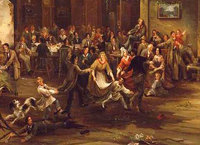Louisa May Alcott (1832–1888)
Reprinted in Work, Eight Cousins, Rose in Bloom, Stories & Other Writings

A number of sources claim that the first mention of Christmas elves was made by Louisa May Alcott in an 1855 story collection called, well, “Christmas Elves.” But that claim is mitigated by a number of caveats: Alcott’s book, written when she was twenty-three, was never published; since the manuscript was either lost or destroyed, we don’t really know anything about its contents or if Alcott’s elves resemble Santa’s little helpers we all know today; and perhaps most important, the 1823 poem “A Visit from Saint Nicholas [Night Before Christmas]” calls Santa himself “a right jolly old elf,” suggesting that the idea of Santa being surrounded by other elves had been bandied about in the several decades before Alcott assembled her manuscript.
Whatever the details of her first attempt at holiday literature, Alcott continued to write Christmas stories and poems during the three decades after her manuscript had been turned down by publishers, and a number of selections appeared in Aunt Jo’s Scrap-Bag, a series of six holiday books for children published between 1872 and 1882. Our current Story of the Week selection presents one of the Scrap-Bag stories, “Kate’s Choice,” an old-fashioned Christmas tale that a number of critics and readers regard as a precursor to her popular novel Eight Cousins.



